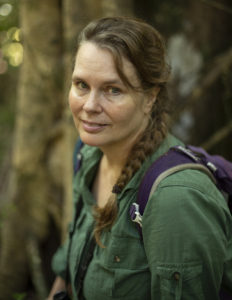
Dr. Cheryl Knott, Professor of Anthropology, Biology, and Women’s, Gender & Sexuality Studies, is featured in The Atlantic for her research of orangutans and her collaboration with local partners in Indonesia.
The article, titled “The Pandemic Is Undoing Field Researchers’ Oldest Assumption,” highlights the practices done by Dr. Knott that allows her research to continue without her during and after the COVID-19 pandemic. Her tracking project is one of the most extensive studies of wild orangutans in the world. Fascinated by the unique characteristics of orangutans in Borneo, she started her research in 1994. She employed local researchers to allow people in local communities to get paid and participate in studying animals. Over the years, she trained local research assistants the skills needed to research and conserve animals and the environment, in contrast with “parachute science”, where foreign scientists research without building scientific capacity in their research site.
Dr. Knott’s effort in empowering locals to conduct research breaks the long-standing assumption that western researchers must do the work themselves. “If we want to create change, if we want to save our planet, then it shouldn’t matter who’s doing the work,” said Asha de Vos, a marine biologist in Sri Lanka, also featured in the article. “What should matter is that the work is done.”
You can read the full article here.